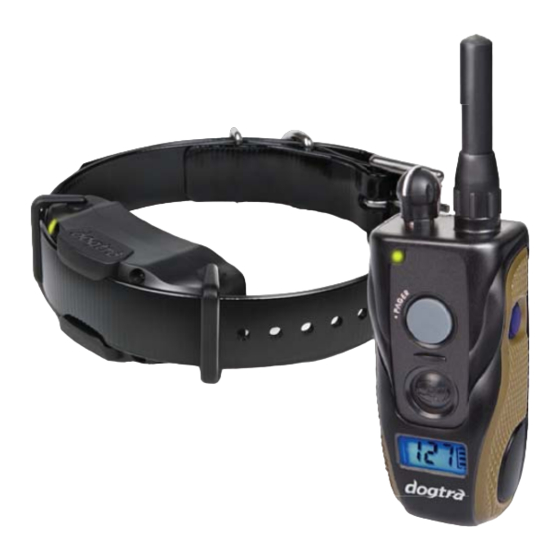Dogtra EF3000 Manual do Proprietário - Página 12
Procurar online ou descarregar pdf Manual do Proprietário para Produtos para animais de estimação Dogtra EF3000. Dogtra EF3000 18 páginas. Remote controlled dog training collars
Também para Dogtra EF3000: Manual do produto (14 páginas)

ADDITIONAL PARTS
ADDITIONAL PARTS
18ga Underground Fence Wire (500 feet)
Boundary Training Flags (50 ea)
The figures on p.18 are indicated for a rectangular layout. Actual
flag/wire requirements may vary depending on the layout you've chosen.
You will want to keep a signal field (area where the dog will receive
stimulation) at least 6-8 feet on each side of the wire.
In addition, your dog will keep 2-4 feet away from the signal field, so an
overall signal field of 8-12 feet is preferred. Avoid making passageways
that are too narrow (i.e. along the sides on a house) or your dog may
hesitate from using them.
Tools
To install your
Phillips screwdriver and a wire cutter/stripper. If your layout calls for the
wires to be connected across concrete, you will also need a caulking gun,
exterior silicon caulk and a circular saw with a masonry blade for cutting
the pavement.
20
, you will need a flat-edge spade,
Creating a Neutral Zone in the Boundary
You must create a neutral zone from the fence transmitter, to the
beginning of the fence. Your dog will be able to cross over the
without getting stimulation. Start by twisting the two
pieces of fence wire so they are braided (see diagram), from the beginning
of the neutral zone area to the end. Braiding the two wires will interrupt
the signal of the buried fence, thus creating an area for your dog to cross
without getting stimulation.
To braid the fence wire, hold the two wires side by side, and twist them
around each other. This can also be done by securing the two wire ends in
the opening of a drill and letting the drill twist the wires for you. The
tighter the wires are twisted, the better the signal cancellation. A braid of
approximately 16 twists per foot is recommended.
Burying The Fence Wire
IMPORTANT : Before starting any digging, contact your local phone,
gas and power companies to locate any other buried services. The
boundary wire does not have to be buried to operate.
For protective measures we highly recommend the wire be buried about
3-4 inches underground. Begin by digging a 4-inch deep cut where the
wire first enters the ground near the transmitter and continue around the
path of the loop wire. A 30- to 45-degree angle cut made with a flat-edge
ADDITIONAL PARTS
21
